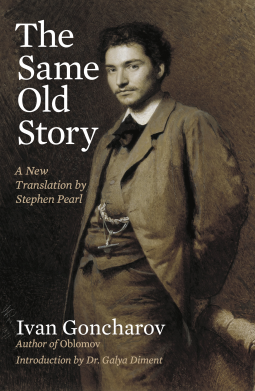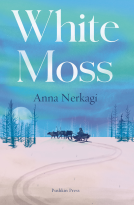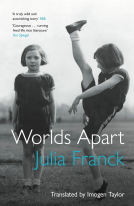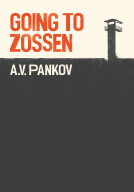
The Same Old Story
A New Translation by Stephen Pearl
by Ivan Goncharov
This title was previously available on NetGalley and is now archived.
Send NetGalley books directly to your Kindle or Kindle app
1
To read on a Kindle or Kindle app, please add kindle@netgalley.com as an approved email address to receive files in your Amazon account. Click here for step-by-step instructions.
2
Also find your Kindle email address within your Amazon account, and enter it here.
Pub Date Mar 30 2017 | Archive Date Jun 30 2017
Bunim & Bannigan, Ltd. | Bunim & Bannigan
Description
Advance Praise
"This book made Goncharov famous in Russia. And from half a continent and three lifetimes away he can still make new readers laugh and gasp with recognition over timeless human foibles, so I am glad that he was translated, and I trust you will be, too."
-- Nicholas Lezard, The Guardian
"This is the endlessly repeated tale of how the young lose their saving illusions. ...From his first clumsy and awkward arrival in St. Petersburg, Alexander encounters not only the cold cynicism of his uncle (Pyotr), but also the warmer and more ironical sympathy of his aunt... It is only very slowly that we begin to realize that this is not about what happens to the nephew -- it is a wistful story about what happens to the older man ... What Goncharov is so brilliant at doing and what Pearl conveys so well, is the slow-paced, gently unfolded dialogue in which more seems to be left unsaid than said, but which nonetheless leaves both interlocutors changed."
-- A.N. Wilson, Times Literary Supplement
Marketing Plan
About the Author:
Ivam Goncharov (1812-1891) is one of the greatest realists of Russian literature. His novel Oblomov and other works are considered classics of Russian fiction.
About the Translator:
After receiving an M.A. in Classics from St. John’s College, Oxford University, Stephen Pearl learned Russian in the RAF during National Service. He was simultaneous interpreter at the United Nations for more than thirty years and was Chief of English Interpretation there for fifteen years, and designed his own innovative Interpreter Training Method, which has been used in numerous universities in the United States, Britain, Russia, Cuba, Spain and China. His translation of Oblomov was awarded the 2008 ATSEEL Prize for Best Translation from Slavic language to English.
The Same Old Story [Bunim & Bannigan, Ltd.] is currently available for pre-order via Amazon, and will be available wherever books are sold as of March 31, 2017.
Available Editions
| EDITION | Other Format |
| ISBN | 9781933480404 |
| PRICE | CA$19.99 (CAD) |
Average rating from 5 members
Featured Reviews
 Philipa C, Reviewer
Philipa C, Reviewer
100 years after the Russian Revolution which overthrew the Romanov royal dynasty I had hoped to immerse myself in some more Russian literature. This was the first novel I had read by Ivan Goncharov(1812-1891) and from reading a little about the writer, it appears "The Same Old Story" is very much autobiographical.
We begin in the Russian countryside where the Aduyeva family is preparing to bid a farewell to its son Alexander (Sasha) who is off to live in St Petersburg.
His mother is distraught, only consoled by the knowledge her son will be looked after by his loyal valet Yevsi and nearby his uncle Pyotr Ivanych. Images of setting are very much to the fore in the novel as the natural , green and lush sweep of his home estate in contrast with the dust, cramped buildings and suffocation of city life.
Alexander is a naive and idealistic young man who also writes. Although helped by his uncle to get a bureaucratic form filling job he views his nephew with disdain as the 'spoilt brat' escaping his mother's apron strings.
Leaving a potential romance at home Alexander soon embarks on a passionate liaison, but despite 'fatherly' advice that he continues to ignore life is doomed for Alexander.
The tragic young man is an image much covered by famous Russian writers from Pushkin to Dostoyesky (who said Goncharov was 'an author of high stature') and this novel reads in a similar vein. Like many 19th century novels the dialogue can seem tedious to readers but I enjoyed the interplay between the experienced uncle cleverly pulling apart his nephew's unrealistic dreams of life. In many ways Alexander gave not only his heart but his head in the search for a 'new life'. In Russia the term 'aduyevschina' came from the main character, implying vain romantic aspirations and I was intrigued to know how close to the real heartbreak of the author was the empty heart of Alexander as the story proceeded.
Not a light read but with stacks of Russian atmosphere and strong main characters. All undertaken with a good translation.
 Annie S, Librarian
Annie S, Librarian
I used to joke that prozac, if invented before 1800, would have wiped out the entire Romantic movement. After reading Ivan Goncharov’s serio-comic novel, The Same Old Story (translated by Stephen Pearl), I’m more convinced than ever than Romantics (even if they produced great art) could have used a little therapy. Originally published in 1848, The Same Old Story, tells the tale of naive and Romantic Alexander Aduyev and his highly practice uncle, Pyotr, as they clash on how to live the best life and how to love.
Alexander has been spoiled all his life. His mother and servants have always attended to his every need. His mother in particular and his first love, Sophia, praised his writing to the skies. But when he moves to St. Petersburg from the country to do something with his life, Alexander suddenly learns that life is a lot more difficult when people insist on not living up to his expectations—mostly informed by Greek epics and Romantic poetry.
His only ally in St. Petersburg is his uncle, whose personality is almost the complete opposite of Alexander’s. Pyotr believes in keeping a steady head, planning for the future, and working his way up the table of ranks. Most of The Same Old Story is written in dialog between the two men as they argue back and forth about what love and life should be. Unlike the dialog in, say, War and Peace, the two make jokes and tease to lighten the mood every now and then while they philosophize. Still, Alexander falls in and out of depression with his changes of fortune, and these can get a little wearying.
The Same Old Story covers eight years in Alexander’s life as he (sort of) grows up and learns to leave some of his high expectations behind. We get to see him fall in love only to have his heart broken, then have another woman fall more deeply in love with him than he was prepared for. We watch him as he realizes that he doesn’t have the talent to become an instant literary phenomenon or the patience to earn acclaim the hard way. But was also get to see Alexander’s effect on his uncle, who slowly realizes, that love, happiness, and emotion can make life worth living.
I enjoyed The Same Old Story. It was kind of refreshing to read a contemporary of the late Romantics take potshots at their overwrought displays of emotion. Not only that, but I was happy to discover that there are other funny Russian writers apart from Gogol and Teffi.
I received a free copy of this book from NetGalley for review consideration. It will be released 30 March 2017.
 melvin u, Reviewer
melvin u, Reviewer
Goncharov was born into a wealthy family. After graduation from the Moscow State University he moved to Saint Petersburg where he worked as a government translator and censor and did private tutoring. He also wrote poetry and his novels.
I was very happy to be given a review copy of Stephen Pearl's new translation of Goncharov first novel, The Same Old Story. Goncharov refused to allow translations of his work during his lifetime and this seems to be the first translation of this work.
Goncharov tells a wonderful very well structured account of the life of Alexander Fyodoryah, from a country gentry land owning family (which also meant serf owning). He is the only child of a widow who totally dotes on him. Aleksander, maybe twenty when we meet him, is bored with country life (masterfully brought to life in the opening chapter) and is determined to move to Saint Petersburg to realize his dream of becoming a famous poet. His uncle Ivan, his mother's brother, lives in Saint Petersburg and with his mother heart broken, she had a lovely affluent bride selected for him he leaves to live initially with his uncle and his wife.
The comic center of the novel is in the conversation and developing relationship of the romantic Aleksander and his cynical very pragmatic uncle. Aleksander tells his uncle of his plans to become a poet, the uncle basically tells him this is just silly and he gets him as a job writing reports for a government agency, totally boring work but it might lead in twenty years to a high ranking position. We see the nephew struggling to be a good employee. In one brutally comic scene, the uncle sets one of the nephew's poems on fire and lights his cigar with it. The uncle notices he seems distracted after a while and assumes he must be in love, which is correct. The uncle lectures him on the folly of this. The conversations of the uncle and nephew are master pieces.
Goncharov does a masterful job with the complicated relationship of the nephew and the young woman he loves, he meets her while out fishing on a weekend in Saint Petersburg. We meet her family and see how Aleksander reacts to a possible rival, a count. The uncle saves his nephew from the folly of a duel. One of the really enjoyable aspects of the novel is seeing how Aleksander and his uncle's relationship changes over the years, Aleksander becomes more like his uncle and the uncle slowly opens up a softer side.
The uncle and the mother keep in close touch through correspondence, the son writes his mother once and a while. He decides to go home. Of course his mother is overjoyed. He is now thirty five, a prime age for marriage and a great catch for a local gentry lady.
At this juncture in the plot things take a very interesting turn, precipitated by an ironically relayed tragedy. I will leave it untold.
The Same Old Story exceeded my expectations, of Russian 19th century writers this novel most reminded me of Turgenev. This novel was a great pleasure to read, not just another book to check of your "required reading" list. Pearl has done lovers of 19th century literature a big favor by translating this novel. He has also translated the much more famous Oblomov and once a Kindle edition of this translation is available I will read it.
STEPHEN PEARL was a simultaneous interpreter at the United Nations for more than thirty years and was Chief of English Interpretation there for fifteen years. He is a graduate of St. John’s College, Oxford University with an M.A. in Classics. His translation of Oblomovwas awarded the 2008 AATSEEL Prize for best translation from Slavic
 Elena C, Reviewer
Elena C, Reviewer
A young idealist leaves his hovering mother behind to go change the world, only to find the world less than eager to be changed. Crushed at a couple of minor setbacks, he falls into a deep depression, and recovers only to become obsessed with money and material success.
The story of one of today's "special snowflakes"? No, it's Ivan Goncharov's classic 1847 novel about Alexander Aduyev, a young upper-class Russian who goes to St. Petersburg to find love and literary immortality, only to discover that he's a poet of middling talent at best, suited more for writing articles on potatoes and manure than producing poems about passionate love, and that his own personal passionate loves end in self-inflicted separation. Possessing, like so many "superfluous men" in 19th-century Russian literature, everything except firmness of purpose and strength of character, Alexander is unable to utilize his gifts of a warm heart and good intentions, not to mention money and connections, precisely because he is unwilling prioritize anything other than a warm heart and good intentions, and, reaching for the stars, finds himself ever more mired in the earth.
Although Goncharov is less well known in the West than Turgenev, Tolstoy, and Dostoevsky, and what fame he does have is mostly connected to his novel "Oblomov," "The Same Old Story" is a delight well worth reading, and, for the easily intimidated, much less of a commitment than bulky masterpieces such as "War and Peace," "The Brothers Karamazov," and "Oblomov" itself. Coming in at a slim 350 pages or so, "The Same Old Story" is an easy introduction to classical Russian literature for those who may have been frightened off by the brick-like productions of Goncharov's more notable compatriots, and a fun read for lovers of Russian literature looking to expand their horizons. While, like any Russian novel worth its salt, "The Same Old Story" has plenty of philosophizing, it's also brisk-moving, and full of that distinctly Russian irony and humor in which the reader is invited to laugh at the characters and feel compassion for them at the same time. Alexander is ridiculous, but his heartbreak is real nonetheless, as is his apparently cold-hearted and condescending uncle's concern for his nephew and his wife. Indeed, Pyotr Ivanych, Alexander's uncle, does everything in his power to make the lives of those close to him as comfortable as possible, while safeguarding them from foolishness and self-inflicted harm, and yet ends up being directly responsible for plunging both his nephew and his wife into states of deep depression that jeopardize not just their happiness, but their physical health. Good intentions, Goncharov seems to be telling us, are not enough: in order to do actual good one must understand what the objects of our intentions truly want, rather than imposing our own goals and desires upon them from above. A lesson that each generation struggles to learn anew.
And indeed, while "The Same Old Story" is firmly rooted in the milieu of mid-19th-century Russia, overflowing with that abundance of detail that is a hallmark of Goncharov's style (something that comes through nicely in Stephen Pearl's new translation, which manages both to read smoothly and to sound like a 19th-century Russian novel), it really is "the same old story," and could be transplanted quite handily to early 21st-century America. Anna Pavlovna, Alexander's mother, is the quintessential helicopter parent, who "for all her loving care, was unable to provide him a proper perspective on life, and had failed to prepare him for the battles in store for him as they are for everyone." In fact, Goncharov tells us, "It would have been even better for her to have loved him a little less, not to have spent every minute of the day thinking about him, not to have spared him every possible trouble and unpleasantness, not to have done his weeping and suffering for him even in his childhood so as to give him a chance of developing a feeling for the prospect of adversity, and a chance to learn to muster his own resources and consider what lay ahead." But that was not to be.
Nor does Alexander's uncle Pyotr Ivanych have the answers either, however. Sounding eerily like modern-day pundits who exhort young people to toughen up, get some "grit," and choose majors and careers based immediate hireability rather than genuine interest, Pyotr Ivanych ruthlessly crushes Alexander's literary aspirations and preaches ad nauseum to him about the value of a steady paycheck and the benefits of a marriage of calculation rather than love. But it is Pyotr Ivanych who discovers in the end the limits of his wisdom: at fifty he has material comfort, yes, but gained at the expense of a bad back, failing health, and a listless and indifferent wife. Perhaps both Pyotr Ivanych and Alexander should have paid closer attention to Liza (the wife) when she still could be bothered to express her own opinion; a comparatively minor character, she still manages to suggest a potential way forward, combining as she does practicality with the ability to preserve other people's happiness. But both Alexander and Pyotr Ivanych are too caught up in themselves to listen to her gentle counsel as much as they should.
Which is not to say that "The Same Old Story" is depressing. Or rather, the ostensible moral of the story is grim, but the book and the characters themselves brim with such humor and life, and the ending is so suggestive of hope that, set against the background of notoriously downbeat Russian literature, "The Same Old Story" is practically a lighthearted comedy. Youthful dreams are pretty much guaranteed not to come true, Goncharov seems to be telling us, but that doesn't mean that there aren't plenty of good things in life, especially for those who are able to reconcile the split between their desires and their despair. "The Same Old Story" may not have the weighty presence or sparkling brilliance of some of the great classics of Russian literature, but it still shines after all these years with a homey and candle-like warmth, illuminating corners of the human heart that should be familiar to all.
My thanks to NetGalley and the publisher for providing a review copy of this book. All opinions are my own.
 sara m, Reviewer
sara m, Reviewer
As a history graduate, naturally I have a few time periods and cultures that I favour towards. Russian History and culture is perhaps the area I feel most interested in.
I have been trying to read more Russian literature so was incredibly pleased to be sent The Same Old Story.
A wonderful story, full of culture and depth. Witty at times and sad at others.
A excellent translation and definitely makes me want to continue on my journey with translated Russian History.
Ivan Goncharov's partly autobiographical first novel is the classic story of a boy who is spoiled rotten by his mother, and leaves his life of comfort in the provinces in hopes of achieving greatness in the big city. But rather than finding instant fame, true love, and success in St Petersburg, Alexander Aduyev is shocked to realize he is not all that, after all. Since he isn't capable of performing the slightest task by or for himself, this man-child makes the mistake of looking to his uncle Pyotr Aduyev for succor - the least nurturing, soft-hearted, or maternal-minded person possible. What follows is a farcical romp through the stages of Tough Love for the Hopelessly Romantic, it's like an allegorical version of The Rules: The Time-Tested Secrets for Capturing the Heart of Mr. Right!
 Mandy J, Reviewer
Mandy J, Reviewer
Best known to an English-speaking readership for his novel Oblomov, it’s a real treat to discover an equally enjoyable read from this under-appreciated Russian novelist, and one in such a good translation too. First published in 1847, it’s a long novel and not a lot happens in it but as a character study and a portrait of Russian society at the time it is both entertaining and informative. It’s the story of an immature and hopelessly romantic provincial young man who dreams of fame as a writer and leaves his doting mother to move to St Petersburg, full of hope and unrealistic ambition. He’s taken up by his Uncle Pyotr, a calculating and pragmatic man who attempts to strip his nephew of his romantic notions and make him face up to the realities of life. Naturally Alexander takes no notice of his uncle and “the same old story” ensues – infatuation, unrealistic expectations, rejection, despair. It’s an often humorous and always a gentle story. The conversation between uncle and nephew show how diametrically opposed in attitude the two men are, but there’s no malice there and in his way the uncle does his best for his silly charge. A classic of Russian literature, it can rightfully take its place alongside more familiar great works and I hope it gives as much pleasure to others as it did to me. Essential and enjoyable reading for anyone interested in Russian literature.
Readers who liked this book also liked:
John Kotter; Holger Rathgeber
Business, Leadership, Finance, Nonfiction (Adult)
Rachel Joyce
Historical Fiction, Literary Fiction, Women's Fiction


















